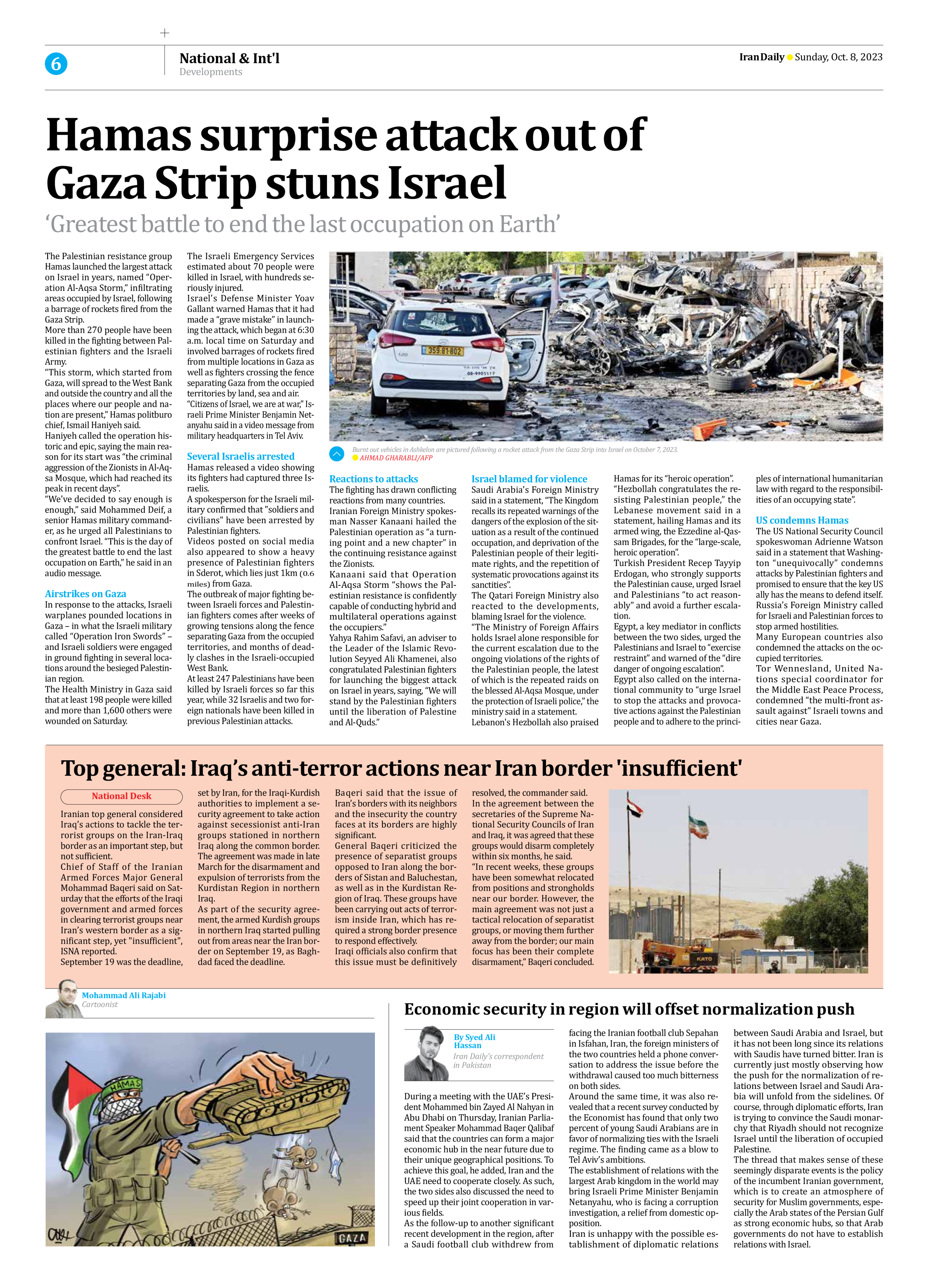
Hamas surprise attack out of Gaza Strip stuns Israel
‘Greatest battle to end the last occupation on Earth’
The Palestinian resistance group Hamas launched the largest attack on Israel in years, named “Operation Al-Aqsa Storm,” infiltrating areas occupied by Israel, following a barrage of rockets fired from the Gaza Strip.
More than 270 people have been killed in the fighting between Palestinian fighters and the Israeli Army.
“This storm, which started from Gaza, will spread to the West Bank and outside the country and all the places where our people and nation are present,” Hamas politburo chief, Ismail Haniyeh said.
Haniyeh called the operation historic and epic, saying the main reason for its start was “the criminal aggression of the Zionists in Al-Aqsa Mosque, which had reached its peak in recent days”.
“We’ve decided to say enough is enough,” said Mohammed Deif, a senior Hamas military commander, as he urged all Palestinians to confront Israel. “This is the day of the greatest battle to end the last occupation on Earth,” he said in an audio message.
Airstrikes on Gaza
In response to the attacks, Israeli warplanes pounded locations in Gaza – in what the Israeli military called “Operation Iron Swords” – and Israeli soldiers were engaged in ground fighting in several locations around the besieged Palestinian region.
The Health Ministry in Gaza said that at least 198 people were killed and more than 1,600 others were wounded on Saturday.
The Israeli Emergency Services estimated about 70 people were killed in Israel, with hundreds seriously injured.
Israel’s Defense Minister Yoav Gallant warned Hamas that it had made a “grave mistake” in launching the attack, which began at 6:30 a.m. local time on Saturday and involved barrages of rockets fired from multiple locations in Gaza as well as fighters crossing the fence separating Gaza from the occupied territories by land, sea and air.
“Citizens of Israel, we are at war,” Israeli Prime Minister Benjamin Netanyahu said in a video message from military headquarters in Tel Aviv.
Several Israelis arrested
Hamas released a video showing its fighters had captured three Israelis.
A spokesperson for the Israeli military confirmed that "soldiers and civilians" have been arrested by Palestinian fighters.
Videos posted on social media also appeared to show a heavy presence of Palestinian fighters in Sderot, which lies just 1km (0.6 miles) from Gaza.
The outbreak of major fighting between Israeli forces and Palestinian fighters comes after weeks of growing tensions along the fence separating Gaza from the occupied territories, and months of deadly clashes in the Israeli-occupied West Bank.
At least 247 Palestinians have been killed by Israeli forces so far this year, while 32 Israelis and two foreign nationals have been killed in previous Palestinian attacks.
Reactions to attacks
The fighting has drawn conflicting reactions from many countries.
Iranian Foreign Ministry spokesman Nasser Kanaani hailed the Palestinian operation as “a turning point and a new chapter” in the continuing resistance against the Zionists.
Kanaani said that Operation Al-Aqsa Storm “shows the Palestinian resistance is confidently capable of conducting hybrid and multilateral operations against the occupiers.”
Yahya Rahim Safavi, an adviser to the Leader of the Islamic Revolution Seyyed Ali Khamenei, also congratulated Palestinian fighters for launching the biggest attack on Israel in years, saying, “We will stand by the Palestinian fighters until the liberation of Palestine and Al-Quds.”
Israel blamed for violence
Saudi Arabia’s Foreign Ministry said in a statement, “The Kingdom recalls its repeated warnings of the dangers of the explosion of the situation as a result of the continued occupation, and deprivation of the Palestinian people of their legitimate rights, and the repetition of systematic provocations against its sanctities”.
The Qatari Foreign Ministry also reacted to the developments, blaming Israel for the violence.
“The Ministry of Foreign Affairs holds Israel alone responsible for the current escalation due to the ongoing violations of the rights of the Palestinian people, the latest of which is the repeated raids on the blessed Al-Aqsa Mosque, under the protection of Israeli police,” the ministry said in a statement.
Lebanon's Hezbollah also praised Hamas for its “heroic operation”.
“Hezbollah congratulates the resisting Palestinian people,” the Lebanese movement said in a statement, hailing Hamas and its armed wing, the Ezzedine al-Qassam Brigades, for the “large-scale, heroic operation”.
Turkish President Recep Tayyip Erdogan, who strongly supports the Palestinian cause, urged Israel and Palestinians “to act reasonably” and avoid a further escalation.
Egypt, a key mediator in conflicts between the two sides, urged the Palestinians and Israel to “exercise restraint” and warned of the “dire danger of ongoing escalation”.
Egypt also called on the international community to “urge Israel to stop the attacks and provocative actions against the Palestinian people and to adhere to the principles of international humanitarian law with regard to the responsibilities of an occupying state”.
US condemns Hamas
The US National Security Council spokeswoman Adrienne Watson said in a statement that Washington “unequivocally” condemns attacks by Palestinian fighters and promised to ensure that the key US ally has the means to defend itself.
Russia’s Foreign Ministry called for Israeli and Palestinian forces to stop armed hostilities.
Many European countries also condemned the attacks on the occupied territories.
Tor Wennesland, United Nations special coordinator for the Middle East Peace Process, condemned “the multi-front assault against” Israeli towns and cities near Gaza.







